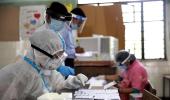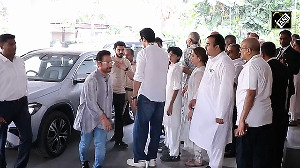Physical distancing and other interventions such as the use of face masks and hand hygiene may help prevent a second wave of COVID-19 infections, and remove the need for future lockdowns, according to a modelling study.

The findings, published in the journal Nature Human Behaviour, also show that, in countries that have not yet reached the peak of active cases, lockdowns must remain in place for at least 60 days and deconfinement must be gradual in order to decrease the risk of second waves.
The researchers from Barcelona Institute for Global Health in Spain noted that several countries that initially imposed strict lockdown measures to limit the spread of SARS-CoV-2 are in the process of lifting them.
However, how and when to ease the restrictions is a difficult decision -- a delicate balance between the need to reactivate the economy and the risk of a second wave of infections that could overwhelm healthcare systems, they said.
"The problem is that assessing this risk is difficult, given the lack of reliable information on the actual number of people infected or the extent of immunity developed among the population," explained Xavier Rodo, head of ISGlobal's Climate and Health programme.
In the latest study, the team present projections based on a model that divides the population into seven groups: susceptible, quarantined, exposed, infectious not detected, reported infectious and confined, recovered and death.
It also allows to simulate both the degree of population confinement and the different post-confinement strategies.
"Our model is different because it considers the return of confined people to the susceptible population to estimate the effect of deconfinement, and it includes people's behaviours and risk perception as modulating factors," Rodo said.
"This model can be particularly useful for countries where the peak of cases has not yet been reached, such as those in the Southern hemisphere. It would allow to evaluate control policies and minimise the number of cases and fatalities caused by the virus," said study co-author and ISGlobal researcher Leonardo Lopez.
The researchers noted that the use of face masks, hand hygiene and 'shelter in place' mandates have already demonstrated benefits.
The aim of the latest study was to quantitatively evaluate their relevance as containment strategies.
The results clearly show that the length of the first confinement will affect the timing and magnitude of subsequent waves, and that gradual deconfinement strategies always result in a lower number of infections and deaths, when compared to a very fast deconfinement process, the researchers said.
The results show that, even in countries that do not have the resources to test and trace all cases and contacts, social empowerment through the use of masks, hand hygiene and social distancing, is key to stopping viral transmission, they said.
Simulations also show that loss of immunity to the virus will have significant effects on the spacing between epidemic waves, according to the researchers.
If immunity has a long duration -- one year instead of a few months -- then the time between the epidemic waves will double, they said.
The model considered total lockdowns and used data available until May 25, but did not take into account a possible effect of temperatures on viral transmission.











 © 2025
© 2025